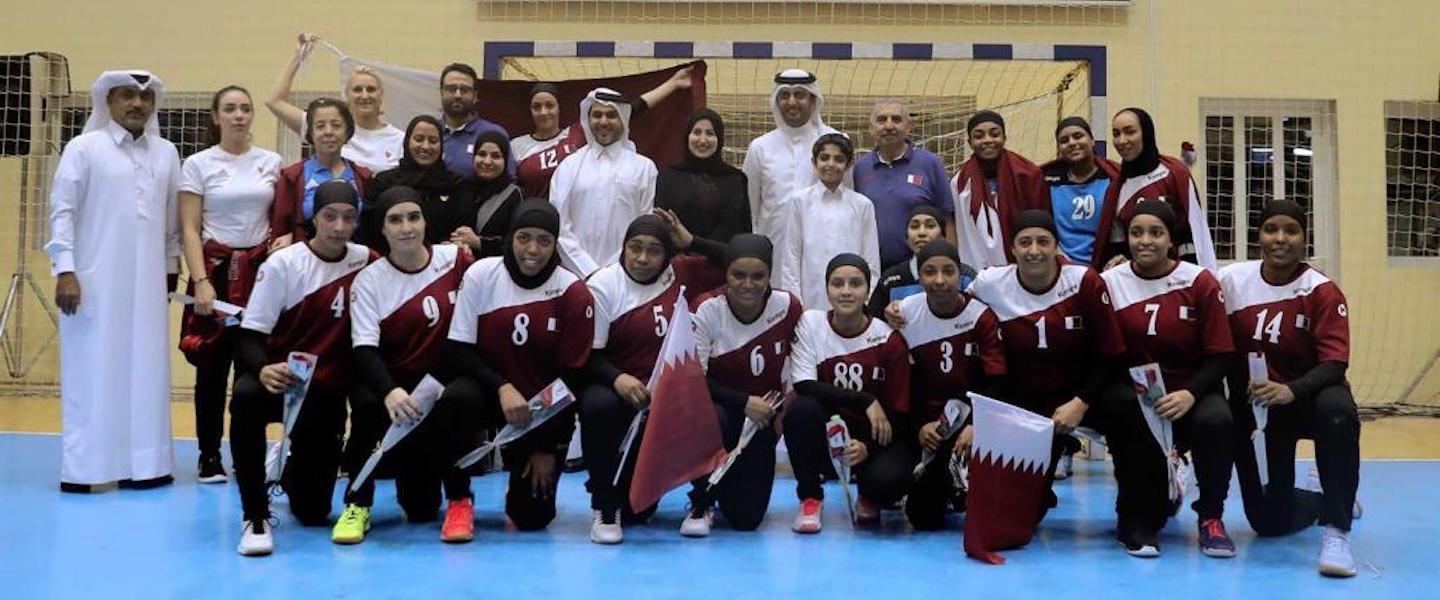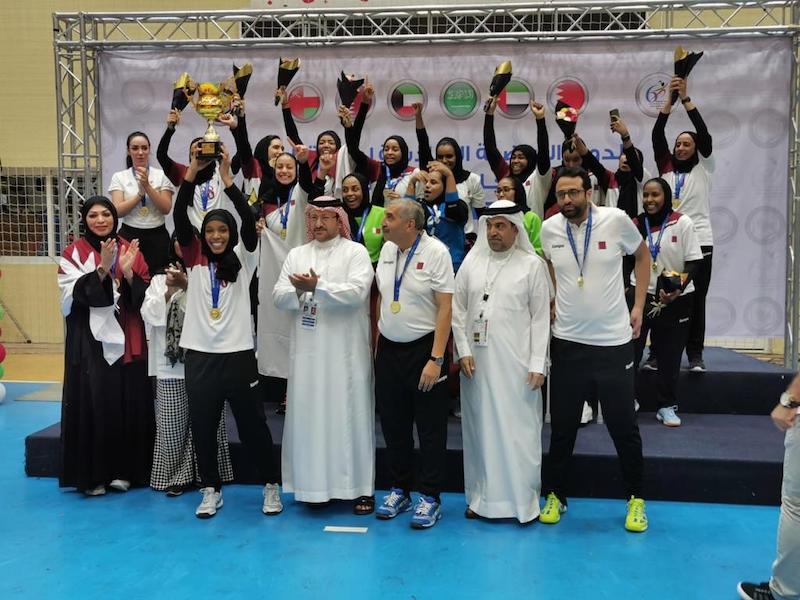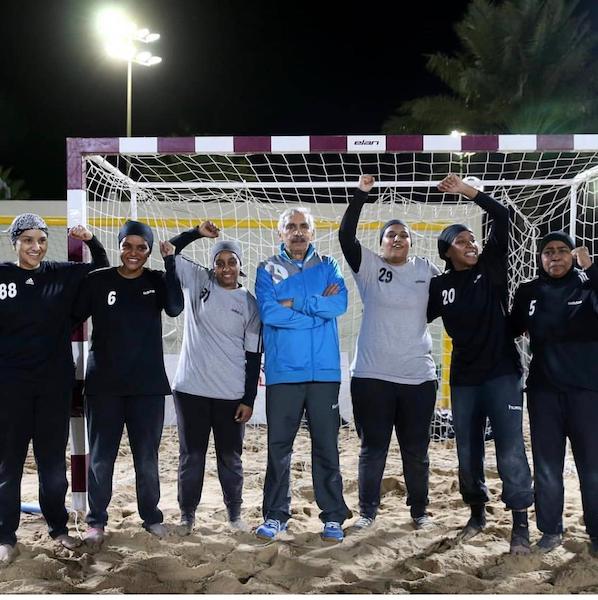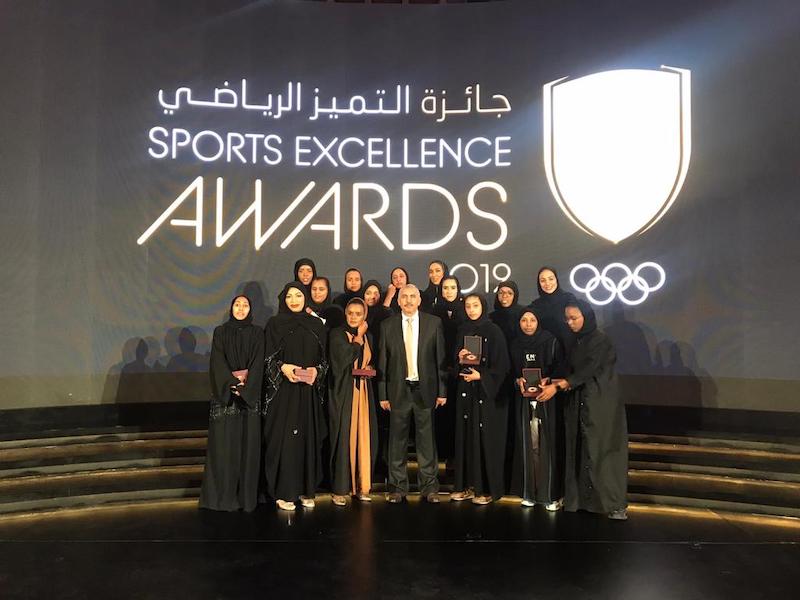News
Qatar’s Al-Bader hoping to spark new generation
14 Apr. 2021

Inspired by Gender Equality Month in March, the IHF celebrates women in various roles in handball across the world.
The focus today is on Qatar women’s international right back Hannah Al-Bader, a mainstay of the national team across the last three decades.
Al-Bader tells ihf.info in her own words about the road to recognition for the women’s game in her country, gender equality and the new generation of handball players and administrators coming through.
Discovering handball and a love for the sport
I was a very active kid into all kinds of different sports – all my life really. In my early teenage years, my Mum and Dad saw how driven and full of energy I was and how much I was into these different sports so they wanted me to play sport.
When I was around 12 years old, the Qatar Women's Sports Committee (QWSC) (Editor’s Note: part of the Qatar Olympic Committee (QOC) with the overall responsibility for the development of women's sport in Qatar) was fairly new in Doha and they had these after-school sporting activities for young women.
I tried out different sports at the school that was nearest to my house, starting first in gymnastics with my sister, and then rotating around different sports to see what would fit the most. Eventually, I tried handball and it just stuck with me.
I love team sports in general, more than individual sports and that's the first thing about handball. I love the team spirit; your teammates are your friends, they're your family. I loved, and love, everything about handball. I love the aggression of the sport. Handball is not an easy sport; it's full of energy and extremely competitive. Handball makes you feel like you can really push your limits mentally and physically.
There’s an aggression to it. It’s a ‘fight feeling’; that you're fighting for something in a good way, not in a bad way. You’re fighting to score a goal or fighting to protect your area and help your goalkeeper; it’s the whole dynamic of the sport.
It’s a contact sport, not like basketball which you can’t say is very aggressive because there’s not really that much contact, but in handball, there’s a lot of physical contact. It’s aggressive, but in a good way not a bad way. I just loved handball and it stuck with me.
I loved watching the Qatar national team playing and I loved watching Ahmed Saad, he was one of the best players. As I grew older, I used to love watching the Croatia women’s team play. I loved their style of play. My current favourite player is the guy from Denmark, Mikkel Hansen. I don’t know why but I just love his style of play.
Representing her country, the bond of a team
My Mum is Irish, she’s from Dublin, and my Dad is Qatari, in fact, almost all of the women’s national team players have either a Qatari father, mother or both, or are born in Qatar with those who do not, raised here, speaking Qatari and are as much Qatari as I am.
The women’s team is great. We basically grew up together; most of us started together and have been together for the past 15+ years. We’re very, very close.
Not putting other team sports down but I think out of all the women’s sports teams in Qatar, I can confidently say we are the closest team in terms of relationships between teammates. We understand and know what each person likes and doesn’t like, how to deal and act with each during training sessions and matches.
Like all handball teams around the world, sometimes in the game you’re full of emotions; you might be agitated by something or someone, but we know how to deal with each other having played together for so long. You know where the emotion is coming from because your teammates are just so driven during games.
Regional rivalry
The last official competition we played in was the 6th Gulf Cooperation Council (GCC) Women’s Games in Kuwait back in October 2019 and we won gold for the third time, defeating the United Arab Emirates 24:21 in the final. We also played in the first two editions of the West Asian Women’s Handball Championship, winning in 2016 in Doha and finishing fourth in 2017 in Jordan.
Asia is a big continent for handball with the Korean women the strongest, as well as Japan too, and we will always strive to compete against the best, even if we know that maybe we’re not at their level. Not even talking for myself, but for the generations after me, you have to start somewhere, and it’s always better for us to get that experience and to play against the best.

What drives me to also play handball is that I want to make myself and my family and my country proud. There’s no better feeling than playing for the Qatar national team.
Finding, recruiting and keeping female players in Qatar
I’m going to be 30 soon and I think I have a couple more years of handball in me and for the younger generation coming through we have to strive to set up a platform for them. We need to have more competition locally, more people participating in more clubs.
This is where we are short in Qatar currently; there’s not enough competition. We need more competition, even if it’s just friendly matches. Just us between ourselves is not enough.
In Qatar, it’s a mixture of reasons, of culture and the small pool of players available. It’s harder for girls to keep playing because at some point they get married, have kids and their priorities change; Qatar is not like countries in Europe or in some parts of Asia.
Here in Qatar, the QOC give us all the opportunities to compete and to gain experience but at the same time we’re not able to be full-time professional athletes. We still have to go to work, to our 7am-2pm jobs and then train. It’s difficult to be a professional handball player when you don’t have enough time. If you’re a professional player, you’re training mornings and evenings at least 5 to 6 days a week, but that’s not the case with us.
Maybe it’s easier with individual sports like athletics, tennis, fencing or shooting for example as you don’t need a big pool of athletes, but for handball, or for any team sport, it’s very difficult to gather so many girls together. Team sport needs many teams and players. Getting the numbers is the obstacle.
So, it’s a shortage and difficulty from both sides. If we are being given this chance, then from our side, the players, we need to get our priorities straight when we are asked ‘are you going to be able to work with us?’.
With such a small pool of players, clubs were promoted the opposite way to how national team and clubs usually work: the best players at clubs get chosen for the national team. In Qatar, the best players were the national team. As national team players we were then split into clubs and allocated – I have played for Al Rayyan and Qatar Sports Club for example – they tried to get the league and clubs moving but there just wasn’t enough players and it is now on hold. Something which needs to happen is sending players out of the country to play for clubs in the region.
Due to COVID-19 everything is on hold. There is no league and we haven’t been training. Recently there was the Qatar Olympic Committee Beach Games where the national team players were split into four teams. It was more of a fun thing as we hadn’t been training that much, and to also change up from what we’ve been going through.
Ensuring gender equality
At a country level, the QOC provide us with the best coaches, the best facilities to train and the best medical teams to take care of us. When we’re on training camp, they are providing us with more than what we need.
However, there are circumstances and situations where they, us and society in general fall short in terms of girls participating. The QOC are trying their best to give us equal opportunities, but it’s just the situation as a whole that doesn’t allow them to give us the whole opportunity even if they wanted to.
But we’ve come a long way since 2012, since we first started the national team. People’s views have changed. It’s no longer ‘girls can’t compete’, even if girls have to cover, or they have to wear their Islamic dress, there’s ways to work around it and thankfully in handball we have never had this issue, or situations with our headscarves.

Despite this, there’s always room for improvement and there’s just a few, let’s say ‘bubbles’, which need to be addressed.
We all welcome the QOC announcement that it will be undertaking a comprehensive Gender Equality Review and also that women’s handball in Qatar will move from being governed by the QWSC to the Qatar Handball Association (QHA) as instructed by QOC President, HE Sheikh Joaan Bin Hamad Bin Khalifa Al-Thani.
This means that we will move to the Duhail Handball Sport Hall, home of the QHA and will be part of the home of Qatari handball with a specific, assigned training facility for us.
Previously, we had been training at the Aspire Zone complex, and the QWSC has done a great job providing facilities for us over the years up to now.
But Aspire was not ‘our’ court and I’m sure it happens in other countries, but the court could be taken from us any time and then we would have to look for another court, so there was nothing there which was ‘constant’ for us.
Moving to Duhail and going under the umbrella of the QHA means we will have the direct attention and handball-specific facilities and support. This will not only help us and our development, but for the younger, future generations.
Inspired to the top of the world by the ‘Boss’
Honestly, Sheikha Asma Al-Thani (Editor’s note: QOC Director of Marketing and Communications who started her attempt to become the first Qatari women to climb Mount Everest this month) is amazing.
I really, really look up to her. She’s outstanding and she beats both women and men with what she’s doing. She’s a ‘Boss’ with what she’s doing, a hard worker and it’s awesome that she’s going to be the first Qatari female to scale Everest.
It really makes me proud because it’s not easy at all. It’s a real challenge for her to go through that both physically and mentally, it’s really tough. It’s amazing and I wish her the best of luck
I hope other girls can get inspired by what she’s doing as it’s just amazing. Given the chance I would love to do it too. I don't know if I could though.
Olympic spirit running through her veins
One of the experiences in my life which means the most to me was when I was chosen to be one of the Young Ambassadors for the Nanjing 2014 Youth Olympic Games (YOG) when I was 22.
I was studying Sports Management at Qatar University after switching from Business Management with a minor in Marketing as I felt that if I’m going to be doing something I might as well do something I love. So, it was something with sport as I saw myself in the administrative side of sport in the future.
It was a new programme at the university with just seven of us graduating and we had the best, most supportive professors at the top of their fields. My senior project was actually about the Youth Olympic Games, so when I went to Nanjing, my professors were totally flexible with letting me skip classes.
The YOG is really such a good idea and such a good initiative for young athletes; to have this bridge between them going from their young careers into the professional athletic world as well as learning about sport, about the values of the Olympic Movement and what it all stands for.

It was also an eye-opener about life during and after sports and shaped me into the woman I am today. I wouldn’t be the person I am without it and I think it's really important for young athletes at that age to have this information given to them and the chance to experience different things. You really feel the true spirit and linked experience of sports.
Life after playing
I always wanted sports to be a part of my life, it just drives me and it’s fun, there’s always change. Nothing is constant, it’s not your typical day job. My day job is working on social media as part of the marketing department of the Qatar National Tourism Council (QNTC) who promote the Gulf country as a destination to visit.
Late last year I was involved in the successful Qatari bid for the hosting of the Asian Games 2030 as part of their ‘Youth Working Group’, an ambassadorial role linked to my Nanjing experience. Maybe I can be part of it going forward and maybe I will make a career move from QNTC to the QOC in the future? That’s on my bucket list.
But, as a player and for my team, this past year has been tough with COVID-19. There hasn’t been training because of lockdown and, for me personally, I haven’t trained for the past three months because I have a problem with my cartilage.
You have an expiry date [as a player] and I’m fading out but hopefully it’s not too soon, although it's bound to happen. This is one of the things they don’t teach you in sport, but if you really love the game, you know you want to stay in it and be a part of it in any way possible.
I'd love to stay involved in handball as an administrator, official or coach and help the younger generation. I have just completed an Asian Handball Federation coaching course led by the amazing Bahraini, Dr Nabeel Taha Al Shehab and there are already many others in our national team looking towards this way, involved in refereeing and coaching courses.
I want the younger generation to discover the same spark together that we had – and still have – in the national team and I hope I can help them with that discovery and see it with my own eyes.
Photos: QWSC; QHA

